Last Chance to Catch NYC's Holiday Notalgia Train
We met the voices of the NYC subway on our nostalgia ride this weekend!


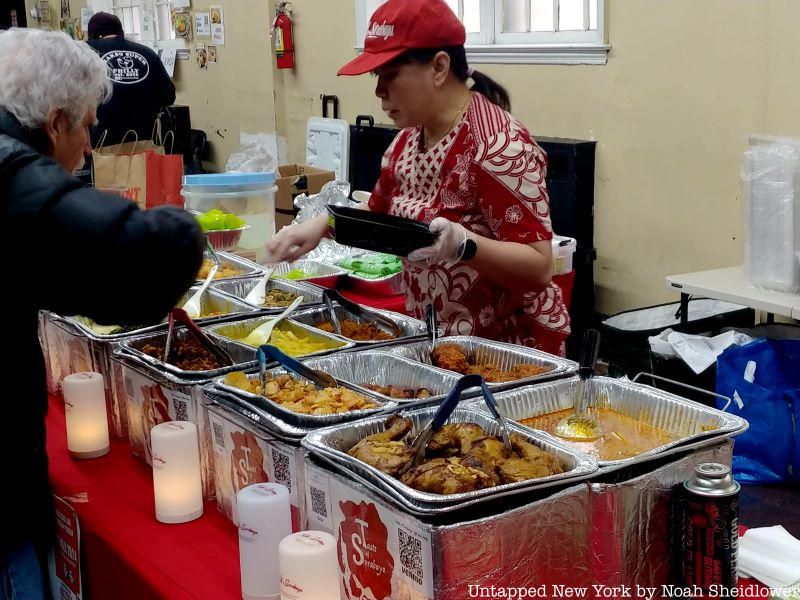
The diverse flavors of Indonesia’s many islands can be savored at the markets, restaurants, and shops of New York City’s Little Indonesia in Elmhurst, Queens. Home to an Indonesian community that’s approximately 5,000, strong, the cultural enclave is located near Little Thailand and Little Manila. Many Indonesian immigrants came to New York following intense mass violence and inter-religious conflicts in the 1990s; the May 1998 riots across major cities led to the resignation of President Suharto and targeted ethnic Chinese Indonesians. In New York, the Indonesian population built a vibrant community in the most diverse borough. Here, we explore the delicious food establishments in Little Indonesia, from a popular food bazaar inside a church to New York’s smallest restaurant that operates just once a week.
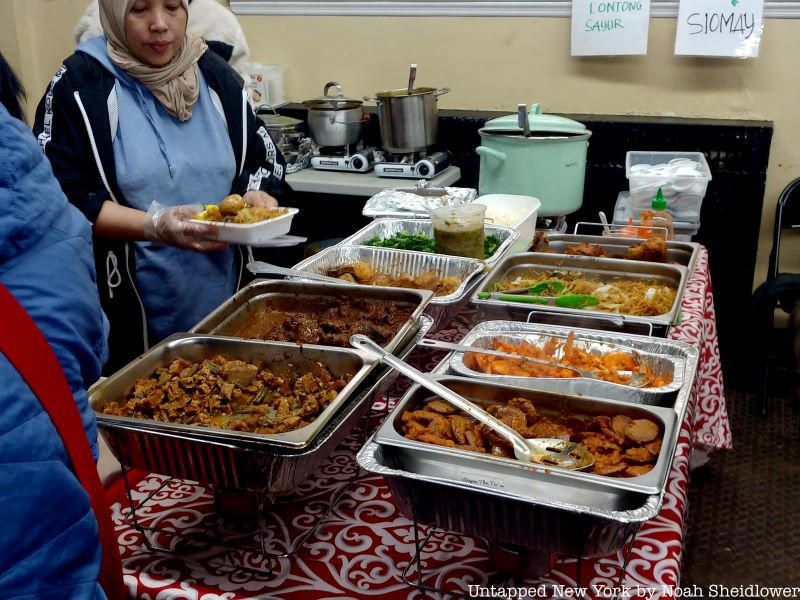

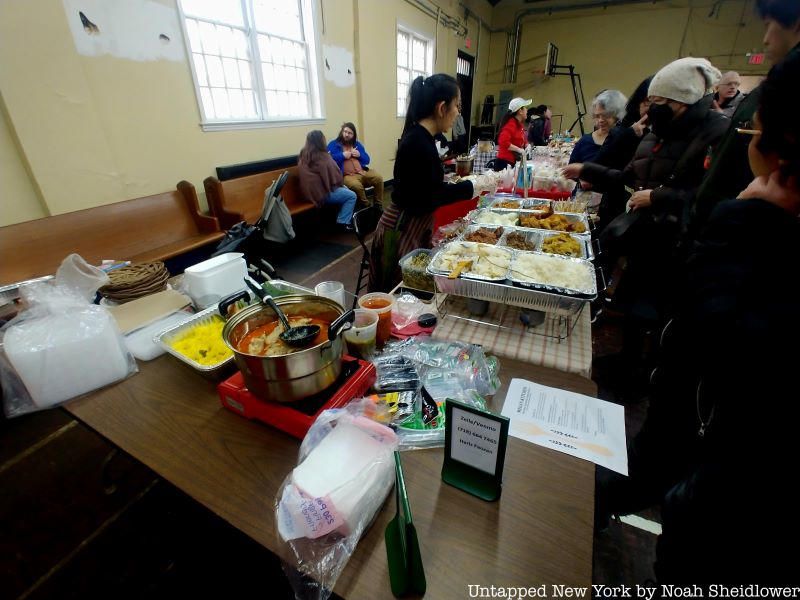

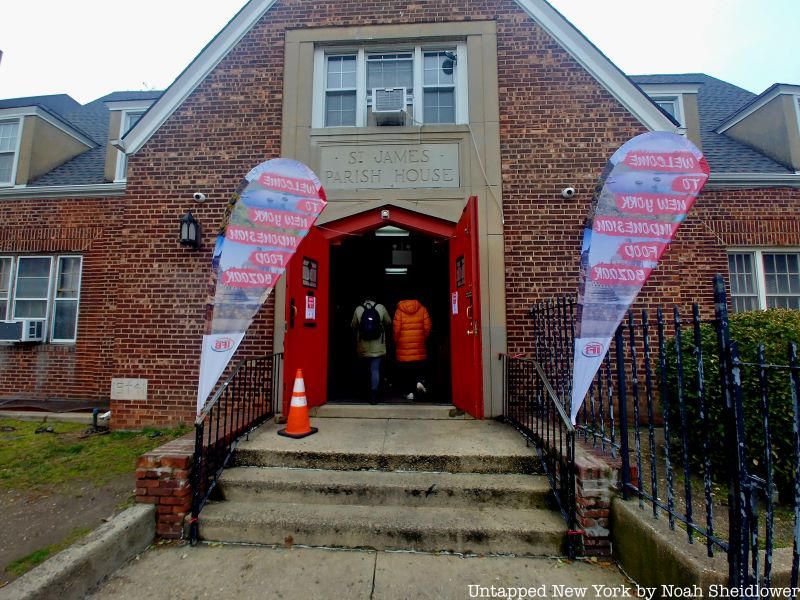
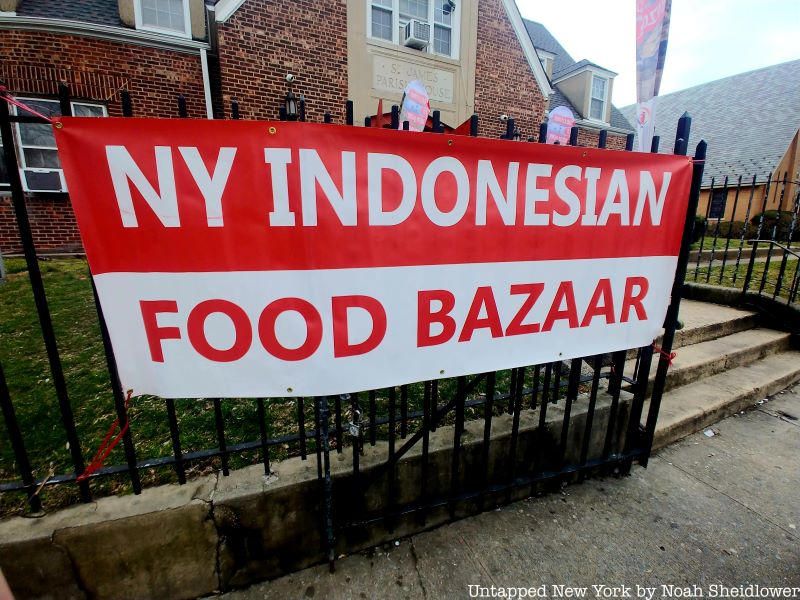
The NY Indonesian Food Bazaar is a once-per-month food event held at St. James Episcopal Church. One Saturday each month, the place of worship becomes a delicious center of Indonesian cuisine and culture rarely found in New York City. The bazaar features around eight vendors selling a mix of specialties from across Indonesia’s many islands. Most of the vendors don’t operate their own restaurants but some run catering businesses. Since starting in 2012, the bazaar has attracted a community of regular vendors and customers. The bazaar was founded by Fefe Anggono, a Chinese-Indonesian immigrant who runs a stall called Taste of Surabaya. She helped recruit cooks through the local community and social media, guiding them in applications for food vendors and fire safety permits.
Many of the vendors at the bazaar are halal, as Indonesia is the world’s largest Muslim-majority nation. Vendors serve up some of Indonesia’s most well-known dishes, including sate ayam (chicken skewers with sambal), beef rendang (a coconut stew), and nasi goreng (Indonesian fried rice). Popular dishes at the bazaar include ketan serundeng (sticky rice with coconut flakes), nasi uduk komplit (coconut rice with side dishes), gudeg jogja (jackfruit stew), and lontong (rice cake wrapped in banana leaves with proteins like squid). Vendors at the market include:
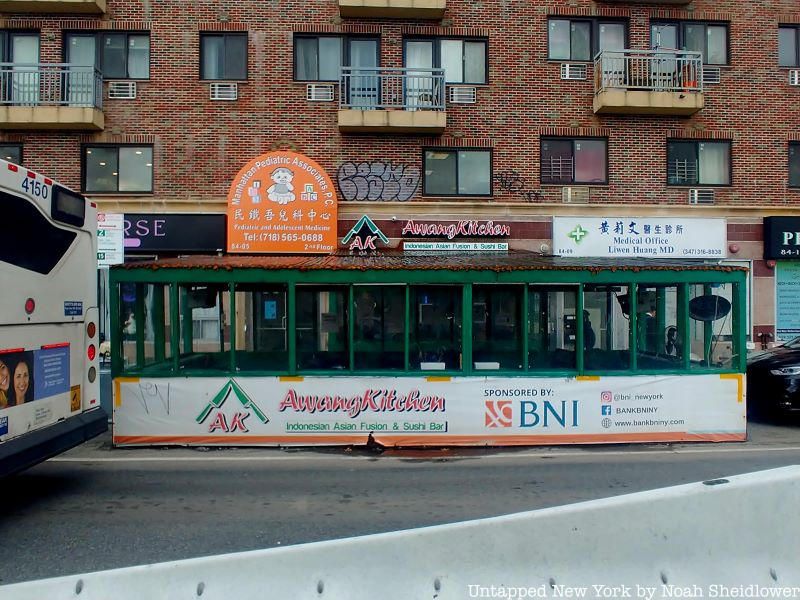
Awang Kitchen on Queens Boulevard opened in 2017, making it one of the newer Indonesian eateries in the neighborhood. The restaurant’s namesake, who also goes by Siliwanga, grew up in Jakarta, influencing the menu’s Javanese influences. Siliwanga ran a catering company for eight years before opening up Awang Kitchen. The six-page menu includes everything from Indonesia’s national dishes to some creative and hard-to-find options.
Appetizers include batagor (fried fish cakes with peanut sauce), sate kambing (goat satay), udang goreng tepung (popcorn shrimp), and tahu gejrot (fried tofu in a spicy sauce). Soups range from grilled short rib to oxtail to Betawi (named for an Indonesian ethnic group, served with beef and tripe with tomato and potato). The stars of the show are the restaurant’s mixed entrees, including ayam goreng kermes (crispy chicken), dendeng balado (spicy fried beef), and nasi bungkus padang (rice stuffed into a banana leaf with jackfruit and egg, accompanied by proteins like cow’s tongue or salty squid). There is a selection of rice and noodle dishes, including half a dozen varieties of nasi goreng, as well as a la carte seafood dishes including red pepper soft shell crab, fried Spanish mackerel, and grilled pompano in a honey sauce.
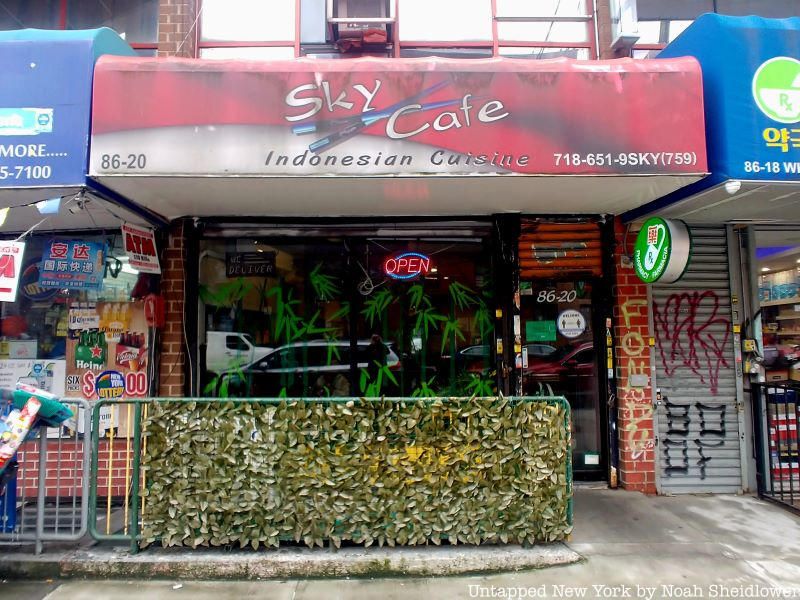
The rather unassuming Sky Cafe was started by Lily Tjia in 2010 in Philadelphia. The New York location opened in 2014. Tija gained popularity for her cooking while preparing dishes for South Philadelphia’s growing Indonesian population, and she decided to open up a restaurant with the encouragement of her diners. Sky Cafe, which takes its name from her granddaughter Skylar, started with a small menu of dishes predominantly from her hometown of Medan in North Sumatra. Tija decided to move to Elmhurst and open a location in the neighborhood, leaving the Philadelphia spot to Skylar’s parents.
The small space, which has just about five tables, serves up starters like gado gado (vegetables and tempeh in a peanut sauce), pempek (fried fish cakes), and pansit goreng (fried wontons with ground chicken). Noodle dishes include varieties of mie goreng (stir-fried egg noodles commonly prepared with seafood), mie bakso (noodles with meatballs and chicken broth), and kari bihun (curry rice noodles with tofu skin, fish balls, and egg). There are nearly 20 rice dishes, such as nasi ayam goreng sambal (spicy green chili chicken), nasi udang sambal petai (shrimp with a stink bean chili), and nasi ayam bakar kecap (sweet soy sauce grilled chicken). Es teler is a popular dessert, consisting of mixed fruit with condensed milk and syrup.
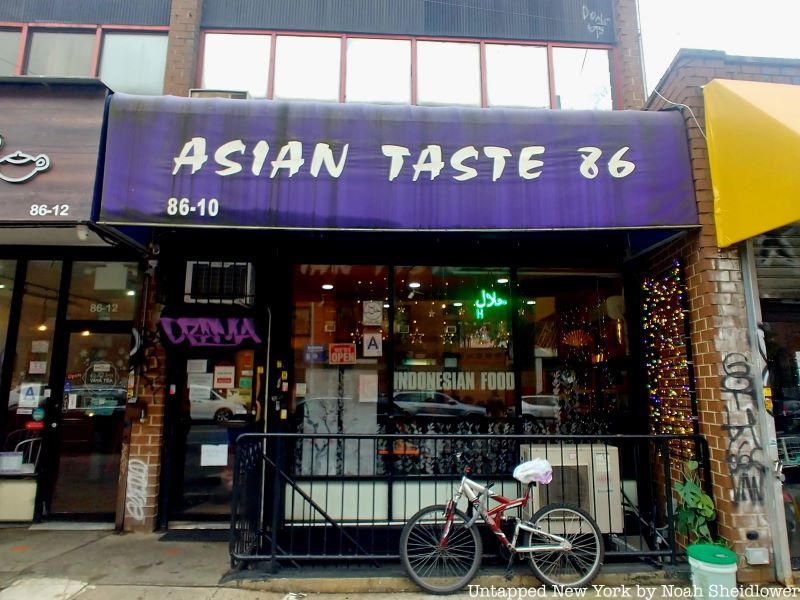
Halal spot Asian Taste 86 is located just a few doors down from Sky Cafe in a similarly small dining room on Whitney Avenue. The Little Indonesia eatery, sporting an orange interior with portraits of Indonesian and Islamic images, was opened in 2011 by Chandra Lie and Donna Liem. The restaurant markets itself as “Indonesian fusion,” as some dishes pull from other Asian cuisines.
Starters include shrimp rolls, shrimp shumai, oyster goreng, and takoyaki squid balls. Soups range from yellow chicken to mixed meatball to lamb curry. One of the most popular dishes is tamarind soup with chicken thighs, while its smashed fried chicken with tofu and sambal is just as filling. Beef dishes include beef jerky with tamarind soup, beef rendang, and Java steak, while seafood options range from catfish to stingray. The restaurant also offers over a dozen noodle and rice dishes, including salty Javanese fish fried rice and seafood mie goreng.
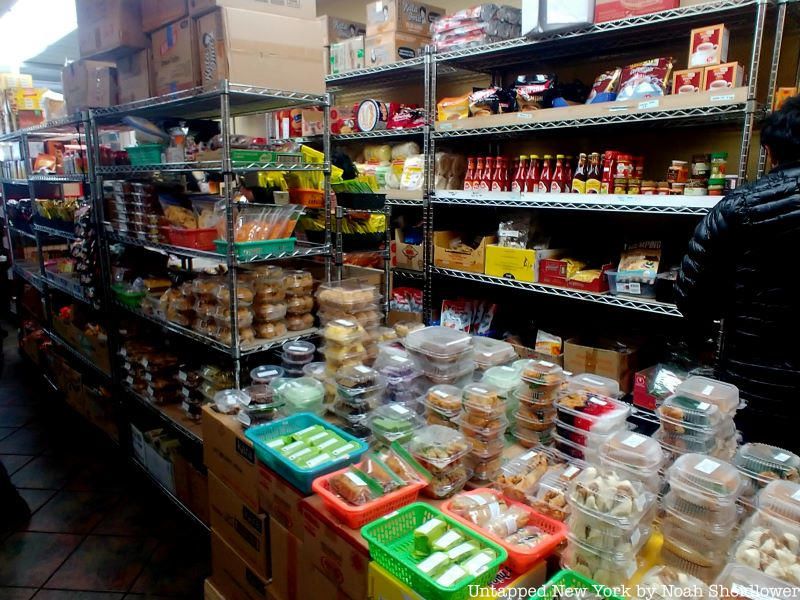
Arguably the most famous spot in Little Indonesia, Indo Java is a small market packed with all sorts of Indonesian produce, meats, prepared foods, and packaged goods. The restaurant is owned by Anastasia Dewi Tjahjadi, who left Indonesia in 1998 and opened Indo Java in 2007. Navigating the narrow aisles may be challenging, as every nook and cranny is filled with goods. The shop offers everything from sambals to sweet pastries in plastic containers to dozens of noodle soup packages.
Perhaps Indo Java is most known for the one-table eatery Warung Selasa, a neighborhood favorite that operates every Tuesday in Little Indonesia. Once each week, Tjahjadi cooks up her favorite Indonesian dishes for customers who camp out in the back of the restaurant munching on dishes like nasi bebek goreng, or fried duck leg with rice. Over the past few weeks, Warung Selasa has served up beef ball soup, coconut beef and tripe soup, vegetable rice cakes, and pecel (vegetables in a peanut sauce with spicy tofu and egg). The kitchen in the back can only fit one person (if that), making this one of the most intimate restaurant experiences in the city.
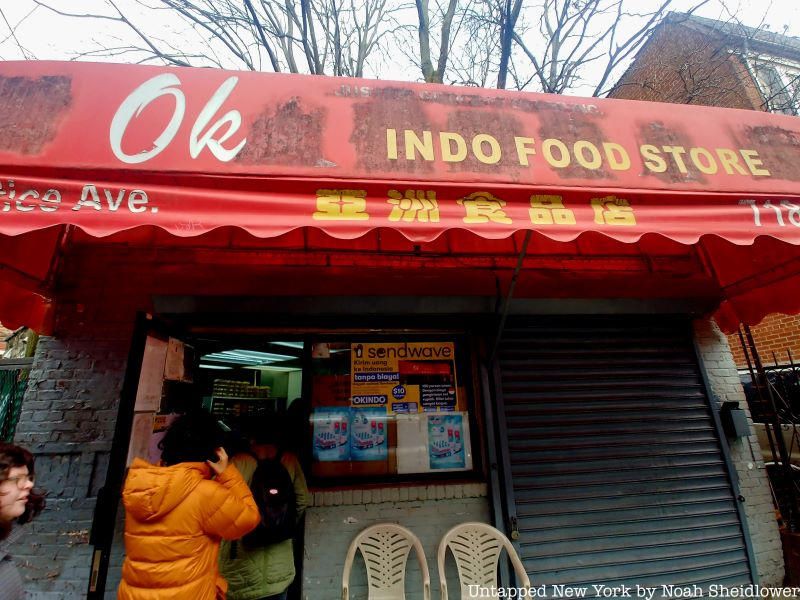
OK Indo Food Store is a tiny, off-the-beaten-path Indonesian grocery store. Recognizable for its red awning, the store sits on Justice Avenue and can comfortably fit only five or six people. On one side of the shop are packaged ingredients like Indonesian spices, mixes, and dry ingredients used for all types of cooking. Packaged noodles and snacks are stuffed into plastic containers, while all sorts of fresh produce are scattered throughout the shop, some in Ziploc bags.
On the other end of the store are stacks of cooked food resembling the menus of some of the neighborhood’s restaurants. Dishes include shumai, nasi lemak, and rice flour pudding. There are also dozens of cakes and other desserts that fill up shelves at the back of the store. While there, make sure to get Teh Kotak, a popular jasmine tea.
Next, check out the Top 10 Secrets of Elmhurst!
Subscribe to our newsletter